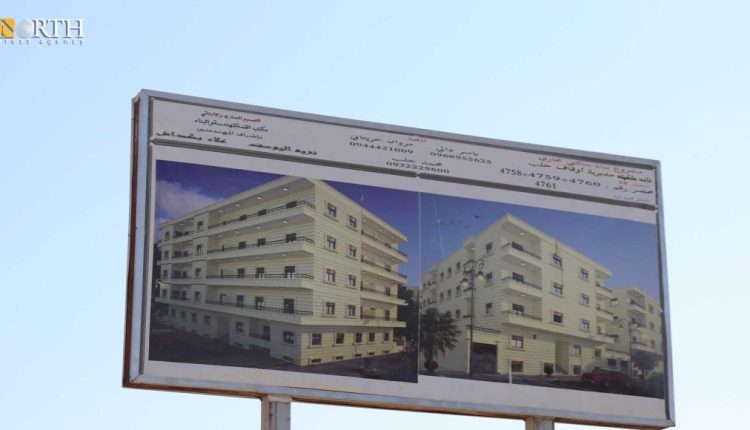
By Ardo Juweid
ALEPPO, Syria (North Press) – In the heart of war-torn Syria, endowment lands meant for charity are being exploited for personal gain by influential figures. This corruption not only erodes trust in government institutions but also deprives the needy of vital support.
The exploitation of endowment properties in government-held areas in Syria highlights a troubling intersection of power and corruption.
These influential figures have turned the endowment lands, which were originally intended to support charitable projects, build mosques, and establish health centers, to sources for illicit incomes.
The corruption and manipulation of endowment revenue distribution deprive the poor and needy of the support they should be receiving.
Fake tenders
Muhammad, a pseudonym for an employee at the government’s Directorate of Religious Endowments of Aleppo Governorate in northwestern Syria, tells North Press that the Syrian Ministry of Endowments is one of the richest ministries in terms of real estate ownership.
It owns a wide range of lands and endowment properties, which were either confiscated by the government over the past decades or donated by their owners for charitable purposes.
The manipulation begins with the announcement of tenders by endowment directorates to lease land, offices, and commercial properties.
Muhammad adds that it is essential to distinguish between legitimate tenders and those that are fake, which use legal procedures to give an impression of legitimacy. Meanwhile, these tenders do not adhering to all established rules to gain large sums of money, as the minimum lease contract for endowments ranges from five to ten years with advance payment.
He points out that one of the main issues is the lack of transparency. Many times, tenders would be announced in a way that is not sufficiently known to applicants, allowing certain parties to control the results to benefit influential decision-makers.
Muhammad says the endowment officials have been the most powerful authority in making decisions within the Syrian government over the past decades, especially Minister Abdul Sattar al-Sayyed, who has taken position since 2007 to this day.
The ministry determines the rental value based on several criteria, such as the location of the land, its area, and the intended use. It works on developing the endowments by signing lease contracts with tenants who develop the lands and buildings and use them in line with variable endowment values.
Muhammad indicates that more than 40 percent of the lands in Aleppo are designated as endowment land for the Ministry of Endowments, including agriculture lands, properties, and hotels.
They are fully invested and the prices of real estate, whether for rent or purchase, do not differ from market prices and increase annually in value.
Fair distribution
Raouf al-Ali, a lawyer from Aleppo, stresses that endowments are vital to the social, economic, and religious cohesion of communities.
Recently however government figures have exploited these endowments in Syria, particularly in Aleppo and Damascus.
According to al-Ali, since the outbreak of the conflict in Aleppo in 2012, the city has seen escalating disputes over lands.
These endowments became a focal point of conflict between government corruption and private opportunism, he notes.
People in power have exploited the chaos and displacement of residents to seize lands owned by associations or individuals.
He says that many owners have been unable to reclaim their rights for years.
He adds that endowments, donated to help the needy and poor, serve charitable, religious, and societal purposes rather than being an annual source of income, which defies the purpose.
Aleppo’s endowments did not respond to the crisis of those affected by last year’s earthquake and did not provide shelters, despite owning vacant residential towers. Many residents were left outside to face the harsh winter.
Violation of rights
Seizing lands relies on several mechanisms, starting with administrative decisions issued under vague conditions to using military or security forces to impose control. The rights of the original residents are ignored or denied due to their displacement.
Muhammad Sumaqia, 75, a resident of al-Jidayde neighborhood in Old Aleppo, says his family owns large areas of lands in the city.
These lands were confiscated and some were turned into a bus garage and hotels. Other historical sites were marked as endowment property by a decision from the National Security Court in Damascus, which ruled that it wouldn’t be returned to its owners.
Sumaqia describes the economic impact of these acts as devastating, as it deprives owners and the poor of benefitting from them through social projects.
“It shakes the people’s trust in government institutions and entrenches a sense of injustice among the owners,” he adds.
He demands that the government reconsider its policies and establish clear and transparent mechanisms to protect individual rights.
He also urges to ensure that public lands are used for the common good, especially since those seizing the properties are relatives of some people in authority who do these acts under the name of the government.
